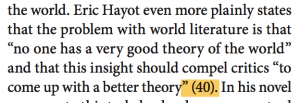In this blog post I’m going to touch on an issue of personal significance to me, so forgive me if it becomes somewhat vehement in tone. It’s subject is the punctuation sequence [“.]!
To clarify, the sequence I am referring to is the close-quotation mark (“), followed by the period (.), or, alternatively, by a comma (,). In the paragraph above, the brackets are employed only to set off the sequence, and the exclamation mark is intended to convey how I feel about seeing a quotation mark followed by a period: exclamatory, in a negative way. This aggravating punctuation is one of the reasons that I look for other things to do when I have papers to grade (this time, blogging is no relief). There is no justification for putting a period (or a comma) outside a quotation mark! Except, that is, if there is an intervening parenthetic page citation.
That’s right, I’m talking about MLA style. For example, here’s a citation from a recent article by Taylor A Eggan in PMLA (Publications of the Modern Language Association), which, of course, uses the MLA stylesheet:
Here’s another example from the same article.
Notice how the comma is pleasingly tucked inside the quotation mark. (Notice also how in both instances the direct quotations are elegantly combined with paraphrase.) In this instance, Eggan is citing the theorist Franco Moretti. Here’s the original passage from Moretti’s essay:
Apparently Eggan, by putting a comma after “unequal,” has inserted punctuation that doesn’t appear in the original. One of the reasons that students persist in placing commas and periods outside quotation marks is because of the commendable but mistaken belief that the space between quotation marks is sacrosanct, not to be adulterated in any way. In practice, though, when it’s grammatically appropriate, authors using MLA-style constantly invade this space with commas and periods; they even punctuate the titles of cited works (short stories, poems, chapters, etc.).
Indeed, if you do a full text search for the sequence [“.] in an MLA journal, you’ll find…nothing.
In student papers, though, I find that sequence all the time.
I do respect my students’ respect for the space between quotation marks. That’s why, at the beginning of each semester, I explain the mechanics of MLA-style citations, and show them examples, patiently trying to preempt the problem. Yet the aberrant punctuation continues to appear in their essays. I can’t eradicate it!
I am not a prescriptivist! This is not a grammar rant!
Honestly, I don’t believe that there’s anything inherently wrong with putting periods outside quotation marks, or inherently correct about MLA-style. Indeed, I freely admit that literary scholars have stuck themselves (and their students) with the WORST citation style. Those damned parentheses! They cause problems with integrating quotations all the time (for example, how does one place a parenthetic citation inside a parenthetic comment?) Sometimes, they force us to alter the syntax of our citations. Footnote or endnote citations are actually much cleaner.
There’s also nothing inherently wrong with putting the title of a novel, even a very long one, between quotation marks:
“Infinite Jest”
And there’s nothing so great about 12-point font.
I like to encourage my students to think of the English major as a discourse community. This concept helps to give some perspective to our seemingly arbitrary guidelines: they’re shared conventions, not rules. The reason we do things the way we do, is because that’s the way we do them. The shared conventions facilitate our communication among ourselves. A large part of being a successful major, in any field, is demonstrating one’s proficiency in that discipline’s discourse conventions.
In conclusion: [.”]:-).
Resource: Quote Integration Prescript.
Cited:
- Eggan, Taylor A. “Regionalizing the Planet: Horizons of the Introverted Novel at World Literature’s End.” PMLA 131.5 (2016): 1299–1315.
-
Moretti, Franco. “Conjectures on World Literature.” Debating World Literature, edited by Christopher Prendergast, Verso, 2004, pp. 148–62.
-
Setina, Emily. “Marianne Moore’s Postwar Fables and the Politics of Indirection.” PMLA 131.5 (2016): 1256–1273.







If you were teaching in England, you’d be the one who’s wrote about where the period goes.
If you were teaching in England, you’d be the one who is wrong about where the period goes.
Stop confusing things with counterfactuals!
“You got it”, said the man in England.